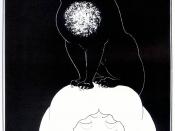Edgar Allan Poe became to be one of the most important writers of 19th Century mostly due to his tales and short stories, though he used to see himself mainly as a poet. He wrote about a variety of subjects, but his stories always involve mystery and grotesque images of the dark side of human been. In this essay I intend to briefly analyse the narrators presented in some of the short stories that we have studied and discussed during the classes.
Poe's stories usually have participant first-person narrators, but frequently we, us readers, face the dilemma of trusting them or not. This is because Poe's narrators are typically unreliable due to their own limitations or mental disorders. Most of the times, the author demonstrate a deep knowledge of the narrators inner feelings and through irony shows us things that the own narrator may not want to say.
The unreliability of the narrator is present in one of Poe's most famous tales: The Black Cat.
In this tale, a man in prison relates the facts that leaded him to the murderer of his wife and finally to his condemnation. Throughout the text we see his degeneration by steps into the condition of grotesque perversity. "To-morrow I die, and to-day I would unburthen my soul." In his cell the narrator has time to reflect on his actions, as a near-death confession, his sincerity and motives are irreproachable. Although is able to intellectualise his problem, he does not perceive the implications of what he says until the end.
Poe's narrator attributes his terrible actions to perverseness, to a bad spirit and to alcohol. "one of the primitive impulses of the human heart--one of the indivisible primary faculties, or sentiments, which give direction to the character of Man...." When the narrator comments that...



Great
Great work, the tales are really well summarized and the interpretations are wonderful.
It is a great work for college level.
2 out of 2 people found this comment useful.